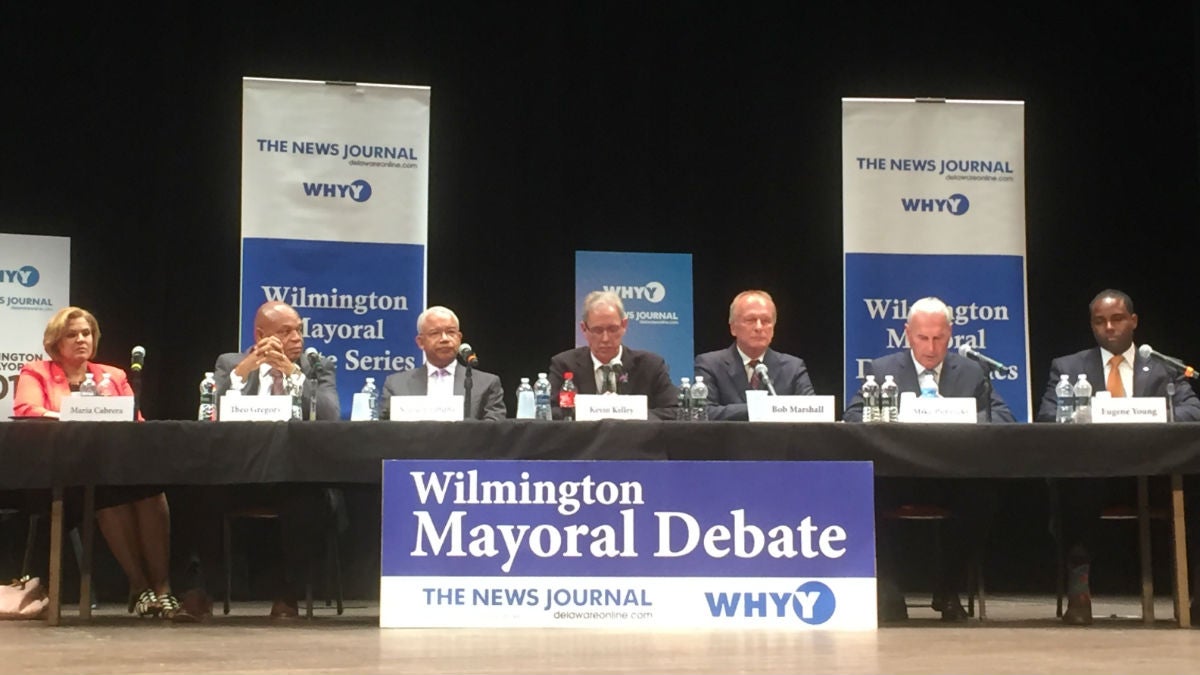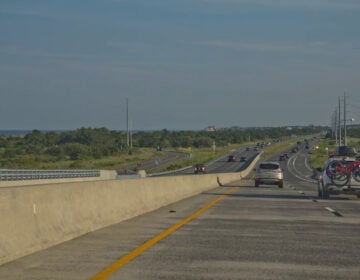Heated debate for Wilmington mayoral candidates

Seven of the eight Democrats running for Wilmington mayor debated public safety issues Thursday night. Those candidates include (from left) Maria Cabrera
Candidates for Mayor of Wilmington debated policing strategies and other public safety issues during their debate Thursday night.
Seven of the eight candidates— all Democrats— attended the debate at Wilmington’s Grand Opera House. Incumbent Mayor Dennis Williams did not attend.
The debate was the second in a series of four meetings hosted by WHYY and the News Journal.
Candidates said how they would prevent and reduce crime in the city if they get through the September 13 primary and are elected into office in November’s general election.
The Democrats also addressed the deaths of two Howard High School of Technology students. Amy Joyner Francis, 15, was killed after a bathroom fight last month, and Brandon Wingo, 15, was shot and killed while walking home from school last week.
“It’s a tragedy we’ve had two young people killed in the city,” said City Council President Theo Gregory. “What the city has to do is put together prevention programs, and intervention programs, and law enforcement programs and reentry programs as we start to bow our way out of the situation we’ve got ourselves in.”
City Councilwoman Maria Cabrera said she spoke with many Howard High students who feel their voices aren’t being heard by the administration.
“I spoke directly to those children….[They said] ‘We need someone to talk with, because you don’t know what it’s like out here. We go to our teachers and administrators, we get bullied and still nothing gets done,’” she said. “Should parents be in fear? Yes, they should. We need to hold people accountable for what happens.
The candidates also discussed ways to improve the police force, and how to implement public safety improvement recommendations issued by the Department of Justice’s Violence Reduction Network.
Cabrera said she would advocate for more community policing, and would have officers stationed in specific locations so residents could form relationships with them. “I believe when we get our officers on the street engaging in the community we see the best come out of both,” she said. “We have to keep the same officers in the neighborhood. We can’t keep switching the officers up.”
Former City Councilman Kevin Kelley said he believes the Wilmington Police Department should work collaboratively with other agencies to share information. However, he said there needs to be an attitude change within the department.
“The police department needs to change from being active to proactive,” Kelley said.
Former City Councilman Norm Griffiths said not only does the police department have a responsibility to improve public safety and community relations, but the mayor also should be a voice for the people.
“You have to represent the people of Wilmington, and you have to advocate however strong you have to advocate to protect our children,” he said.
Mike Purzycki, executive director of the Riverfront Development Corporation, said the City needs to address the root causes of crime, such as poverty. “No one is talking about a vision for how we strengthen neighborhoods, strengthen jobs, step up the economic vitality that would make this issue go away,” he said.
State. Sen. Robert Marshall said he believes creating job opportunities for Wilmington residents would prevent crime in the future. Last year he began work on a Work-a-Day, Earn-a-Pay program which would create public works projects for at-risk men and women to work on and earn a decent living. Marshall said he also would secure funding for other programs that create opportunities for residents.
“I believe one clear direction would be to create a Wilmington trades school that would offer short term skills training in home remodeling and construction, and opportunities like that, with our nearly 1,700 vacant homes boarded up that could be turned into classrooms,” he said.
The debate became heated when candidates were asked why they were more qualified than the other candidates at the table.
Cabrera received a loud applause from the audience when she said, “If you want some change its time to elect a woman with some common sense.”
Gregory cited his years of experience in local government, and attacked non-profit leader Eugene Young for his lack of experience and relatively young age. “You can’t run the city from reading a book,” he said.
Young said he has fresh ideas to bring to the table that would bring the community together and provide resources for those in need.
“We have neighborhoods that have been neglected for years. We have kids who are suffering and hurting and this didn’t just happen yesterday,” he said. “We have to have a larger vision and we have to understand that it doesn’t matter about ones age to the impact they can create.”
WHYY is your source for fact-based, in-depth journalism and information. As a nonprofit organization, we rely on financial support from readers like you. Please give today.





